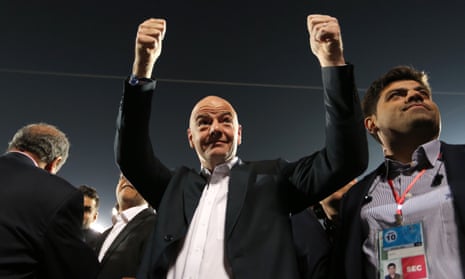The Fifa president, Gianni Infantino, is pressing ahead with the proposal to expand the 2022 World Cup from 32 teams to 48, which would mean matches shared among neighbouring countries hostile to the hosts Qatar.
In an interview with the Guardian marking four years before the World Cup will kick off in Qatar on 21 November 2022, Infantino acknowledges the chances of it happening are “small”, but emphasised his belief that football can help to heal political hostilities which led last year to Saudi Arabia, the United Arab Emirates, Bahrain and Egypt enforcing an economic blockade against Qatar.
“Maybe football is a way to build bridges. We have seen as well with the bidding for 2026, the right to organise the World Cup was awarded to three countries [the USA, Canada and Mexico] which I think also don’t have the very best political or diplomatic relationships. But football makes miracles, as we know.”
Despite global outrage at Saudi Arabia following the murder of the journalist Jamal Khashoggi at the Saudi consulate in Istanbul, Infantino said that discussions about sharing World Cup matches could help Saudi Arabia “evolve” and have “a nice impact.”
“Obviously the relationship with [Qatar’s] neighbouring countries is a factor which is complicating the situation; on the other [hand], even though there are complicated or difficult diplomatic relations, when it comes to football people talk to each other,” Infantino said.
Infantino pointed out that despite the blockade Qatari teams were still playing football in Asian Football Confederation competitions against teams from the other countries in the Gulf and wider Middle East.
“Be positive about it: we can do something for the world – and for football. It could happen, anything could happen. Let’s take it step by step. Yes, maybe the chances are small but I am a very optimistic person generally, so we will see the situation.”
The Qatar “supreme committee” organising the World Cup - which involves the $8bn-$10bn construction of seven entirely new stadiums and one which has been reconfigured is cooperating with a Fifa feasibility study into expansion, but there is little enthusiasm to be found for it in Doha. Saudi Arabia and the UAE led the blockade last June after years of fraught relations over the political positions adopted by Qatar during the Arab spring popular uprisings, and objections to coverage by the Qatari broadcaster Al Jazeera.
Qataris have publicly rallied around their ruler, Sheikh Hamad bin Khalifa al-Thani, and the prevailing mood in the country is that the murder of Khashoggi has shown the world the true repressive nature of the Saudi Arabian regime.
Infantino accepts that having some World Cup matches in other countries in 2022 is the likely logical outcome of a feasibility study into expanding the tournament, because to do so purely in Qatar would be practically very difficult.
“Qatar is having eight stadiums and preparing for the World Cup of 32 teams; of course you don’t need to be Einstein to find out that it might be difficult to organise [a 48 team tournament] in eight stadiums in one country,” he said. “So you probably have to look to share some of the additional games outside of that country; that brings some additional complications and difficulties of course, and they will be looked at.”
Sharing matches, he argues, could help ease hostilities, and despite the outrage at the Khashoggi murder, he did not discount Saudi Arabia being included: “There is certainly no pressure whatsoever on Qatar,” he said.
“There is an open and frank discussion. If it is possible, feasible, I am very happy. If not [and the tournament remains at 32 teams], I am very happy in any case. But I would not have been happy if we hadn’t given it a try.
“If it helps football, great. If as a side effect it has more positive effects in the region it’s even better, because this region is obviously, especially in the current climate, very important for the whole world.”
Asked if Saudi Arabia could become a host, he replied: “We need to take into account the geopolitical situation, hoping that matters will evolve, not for football but for the world. And if any discussion around the World Cup can help in any way whatsoever to make the situation evolve in that region, with regard to Saudi Arabia, it’s a nice impact maybe.”
Hassan al-Thawadi, general secretary of the supreme committee, responded to questions about expansion by stressing the extensive work Qatar is doing to organise the tournament for 32 teams, as they bid for. Talking to the Guardian in his office in Doha, Thawadi said: “Preparations for a 32-team format, with eight stadiums, state of the art, Fifa compliant” was “progressing very well”.
Infantino pointed as an example of football’s ability to promote social progress to the permission in Iran given to women, estimated by Fifa to be 1,000 in a crowd of 80,000, to attend the Asian Champions League final between Tehran’s Persepolis and Kashima Antlers from Japan on 10 November. Women have been banned from stadiums in Iran since 1981, following the conservative Islamic revolution in the country.
“I’m not pretending we are doing everything perfectly, by far not,” Infantino said. “We are making a lot of mistakes, but we are trying to work in an honest way.”
